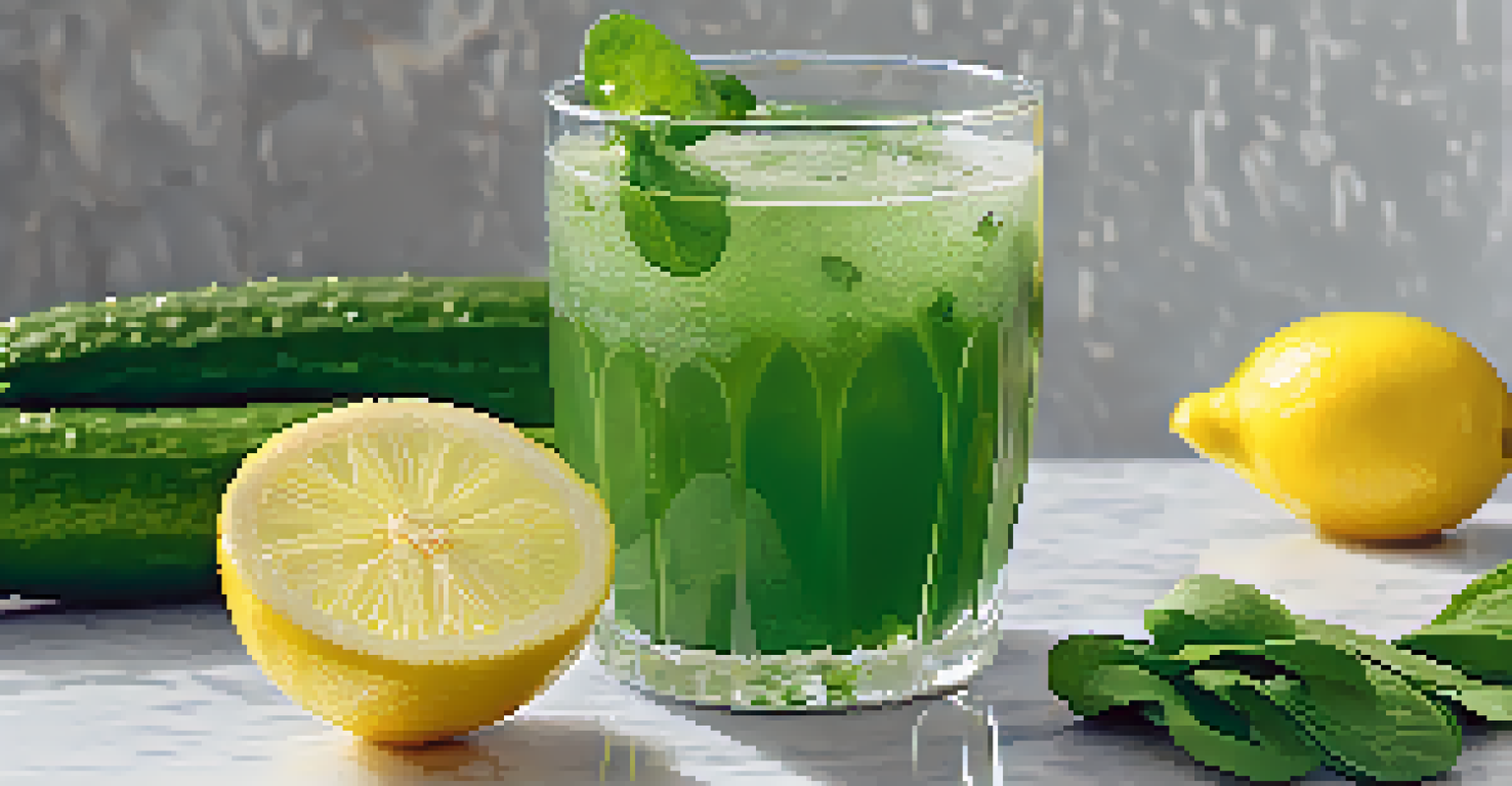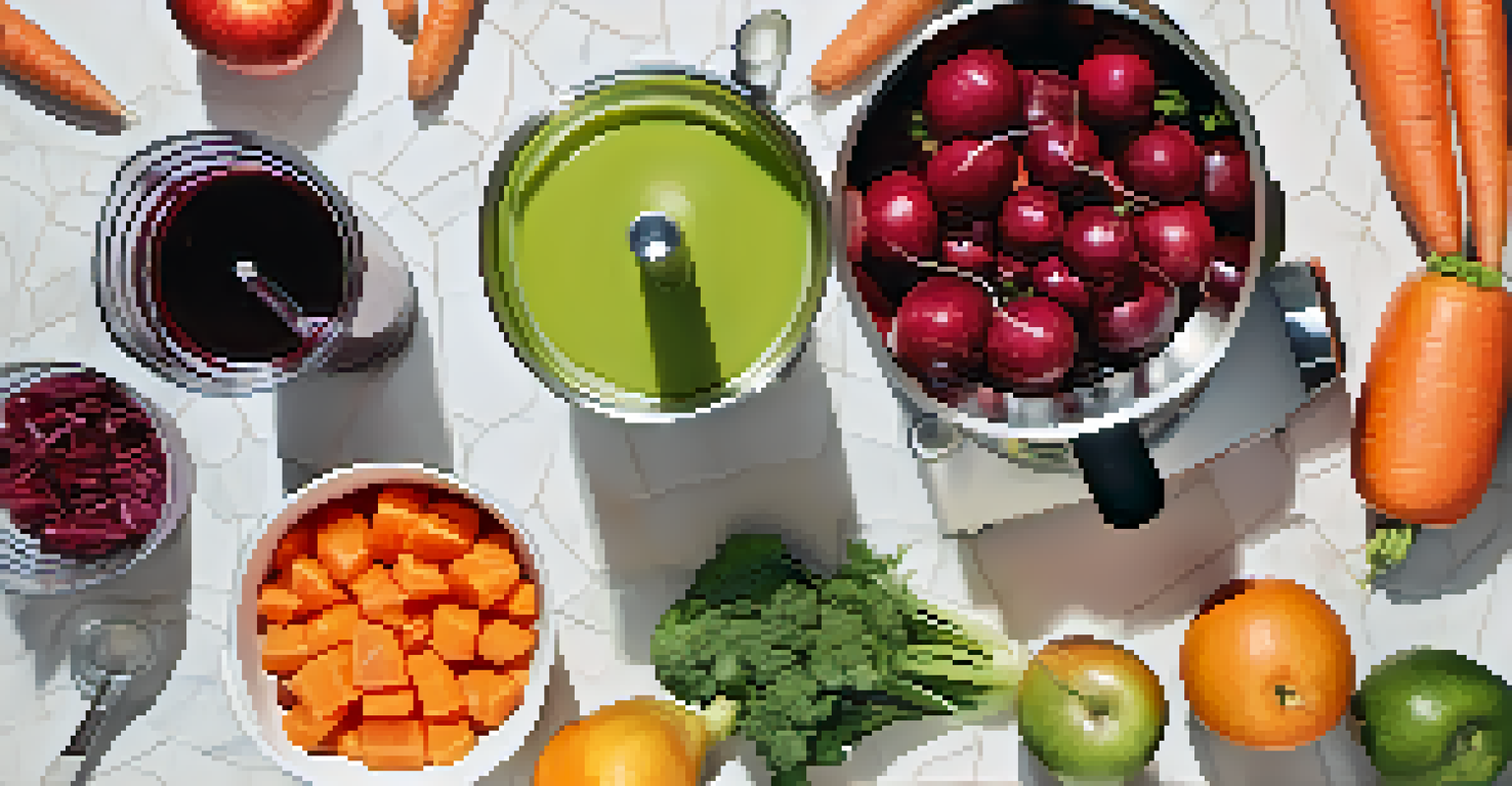Juicing for Digestive Health: Raw Foods in Liquid Form

What is Juicing and Why Should You Care?
Juicing involves extracting the liquid from fruits and vegetables, leaving behind the pulp. This process allows you to consume a concentrated dose of nutrients without the bulk of the fiber. While fiber is essential for digestive health, juicing provides a quick and easy way to absorb vitamins and minerals, especially if you're looking to improve digestion.
Let food be thy medicine and medicine be thy food.
Think of juicing as a shortcut to getting your daily servings of fruits and veggies. For those who find it challenging to eat enough whole produce, a glass of juice can be a tasty alternative. Plus, it’s a great way to sneak in some greens if you’re not a fan of salads!
However, it’s important to note that juicing should complement a balanced diet rather than replace whole foods. Combining both can give you the best of both worlds—quick nutrient absorption from juices and the digestive benefits of fiber from whole fruits and vegetables.
Key Nutrients for Digestive Health
When it comes to digestive health, certain nutrients play a starring role. Vitamins A and C, found in many fruits and vegetables, support the gut lining and overall digestive function. Minerals like magnesium can also help maintain regularity and prevent constipation, making them crucial for a healthy digestive tract.

Antioxidants, often abundant in colorful fruits and vegetables, help combat inflammation in the gut. Ingredients like beets, carrots, and leafy greens are excellent for promoting a healthy digestive environment. By choosing the right ingredients for your juice, you can create a powerhouse drink that supports gut health.
Juicing Supports Nutrient Absorption
Juicing allows for quick absorption of vitamins and minerals, making it easier to consume essential nutrients from fruits and vegetables.
Moreover, incorporating probiotics into your juicing routine, whether through fermented foods or supplements, can enhance your digestive system even further. A healthy balance of good bacteria in your gut can aid in digestion, making your juicing efforts even more effective.
Best Ingredients for Juicing Digestive Health
Certain fruits and vegetables are particularly beneficial for juicing when focusing on digestive health. For instance, ginger is known for its anti-inflammatory properties and can help soothe an upset stomach. Similarly, cucumbers are hydrating and can aid in flushing out toxins from the body.
The doctor of the future will no longer treat the human frame with drugs, but rather will cure and prevent disease with nutrition.
Another great option is pineapples, which contain bromelain, an enzyme that helps break down proteins and may ease digestive discomfort. Leafy greens like spinach and kale are also excellent choices, packed with nutrients that promote overall gut health.
Additionally, incorporating carrots can add sweetness to your juice while providing beta-carotene, which supports gut lining health. Experimenting with different combinations of these ingredients can help you discover what works best for your body.
How Juicing Can Help with Common Digestive Issues
Many people experience common digestive issues, such as bloating, gas, or constipation. Juicing can provide relief by delivering concentrated nutrients that help alleviate these symptoms. For example, a juice made with lemon and ginger can help stimulate digestion and reduce bloating.
If constipation is your concern, a juice rich in fiber, such as one made from apples and pears, can help keep things moving along. The natural sugars and fiber in these fruits can encourage regular bowel movements, promoting a healthier digestive tract.
Key Ingredients for Digestive Health
Certain fruits and vegetables, like ginger and cucumbers, can enhance digestive function and alleviate common digestive issues.
Juicing can also help soothe conditions like irritable bowel syndrome (IBS) by providing easily digestible nutrients. By using gentle ingredients, you can create juices that are less likely to irritate the gut while still delivering essential vitamins and minerals.
Tips for Making Digestive-Friendly Juices
When creating juices that support digestive health, it’s all about balance. Start with a base of hydrating vegetables like cucumber or celery, then add in nutrient-dense fruits and greens. A simple guideline is to fill half your juice with veggies and the other half with fruits for a nutritious blend.
Don’t be afraid to experiment! Adding herbs like mint or parsley can provide fresh flavors while also offering digestive benefits. These herbs can help soothe the stomach and add a refreshing twist to your juice.
Lastly, remember to drink your juice slowly. This not only allows you to enjoy the flavors but also gives your digestive system time to process the nutrients. Sipping rather than gulping can enhance digestion and absorption of those valuable vitamins.
Storing and Enjoying Your Juices Safely
Once you've prepared your juice, how you store it can impact its freshness and nutritional value. It's best to consume your juice immediately for maximum benefit, but if you need to store it, keep it in an airtight container in the fridge and try to drink it within 24 hours.
Be mindful of how you’re enjoying your juice, too. Drinking it on an empty stomach can make it easier for your body to absorb the nutrients, especially if you're using it as a morning pick-me-up. Pairing your juice with a light meal can also help maintain balanced energy levels throughout the day.
Balance and Experimentation Are Key
Creating digestive-friendly juices involves balancing hydrating veggies with nutrient-dense fruits and experimenting with flavors for the best results.
Lastly, pay attention to how your body reacts to different juices. Everyone's digestive system is unique, so take note of what feels good and what doesn't. This practice can help you tailor your juicing routine to best support your digestive health.
Conclusion: Embrace Juicing for Digestive Wellness
Juicing can be a fantastic addition to your journey towards better digestive health. With the right ingredients, you can create delicious and nutritious blends that support your gut. Remember, it’s about finding what works best for you and listening to your body.
As you explore the world of juicing, consider it not just a trend but a lifestyle choice that can enhance your overall well-being. The benefits of raw foods in liquid form are numerous, and with a little creativity, you can make it an enjoyable part of your routine.

So grab your juicer, experiment with different combinations, and toast to your digestive health with every refreshing sip!